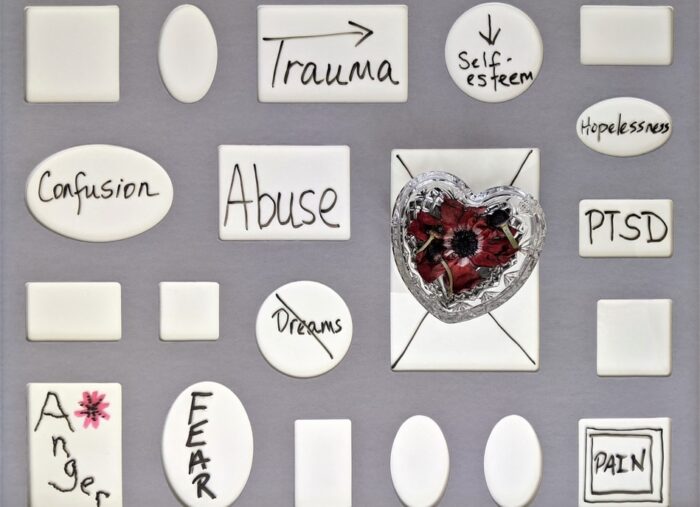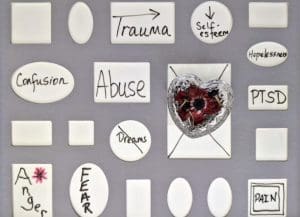#Erased: My Review on the documentary Erasing Family
- Andrew Folkler
- June 5, 2021
- Parental Alienation
Erasing Family is a film that documents and presents the aftermath of family court. In the USA alone, an estimated 22 million children are alienated from a parent and/or family member(s) after the divorce. The trauma of such a separation is incalculable. The child grows up believing an elaborate lie and, in their desperation, they participate in venomous behaviour to keep the lie alive.
Watching the film as a formerly alienated child brought about a myriad of emotions. As I listened to the stories of Dizzy, Caroline, and Corinna, I found myself lost in a sea of memories.
Survive, there is Nothing Else
I was about 6 years old when my parents divorced. My recollection of these years is fragmented and fuzzy. Frankly, I believe my psyche has repressed these memories. Thinking back, I mostly remember the arrival of my stepmother and the swift process of alienation that took place. Within weeks, she gave me a narrative to believe in.
My mother was vilified and as a child I had to accept a black and white perspective. At that point in my life, shades of grey were beyond my comprehension. I just wanted to know what the adults knew. And in my state of vulnerability, I accepted this false narrative as part of my identity.
What Erasing Family does is it unapologetically presents the true face of alienation. Alienation occurs when a child is emotionally manipulated and programmed to ostracise one or more targeted family members. In my experience, I have been on both ends of the spectrum; I was alienated from my mother for 12 ½ years and I have been estranged from my brother for 8 years.
Make no mistake, when a child accepts this narrative, they are acting out of self-preservation instead of malice. A child is not born with hatred, they are taught to act this way. I was interviewing Bill Eddy for my podcast, Broken Families, and he said that alienation functions in the same way as prejudice. Prejudice is the inherent act of repulsion towards a targeted person or a group of people without a legitimate reason. The target is treated as a source of potentially life-threatening danger. The end result is a huge overreaction to the target whenever they attempt to come close, be it socially or physically.
In the Erased Child’s Mind → Intimacy = Danger
Likewise, we see the same in parents who are estranged from their children. The children are taught to believe that intimacy from the erased parent is a sign of life-threatening danger. To the alienated child, that intimacy can jeopardise their safety, their current family, and is a potential gateway to extreme emotional pain.
So why, you might ask, why would erased children like Brandyn or Brian in the film be so comfortable with the alienating parent? Why reject the love of a compassionate parent and turn to affection from someone who is colder, manipulative, and potentially narcissistic?
The answer lies in trauma bonding.
Love Built on Fear
Trauma bonding is the nature of the relationship set up by an abuser and the victim. The abuser uses polarising behaviour to reward obedience and punish disobedience. In doing so, the victim learns to conform to the identity prescribed to them. Over time their true self is eroded. The victim suppresses their emotions when it does not serve their abuser. As a result, they give up their autonomy completely to their abuser.
More importantly, the abuser enmeshes their acts of affection with their antagonistic behaviour. The rationale is inherently toxic; they hit you out of love and to prove their love they ask if they can treat your wounds. The victim’s mind is rewired to associate intimacy and love with aggression and manipulation. This balance of malice and affection is well maintained by the abuser.
Erased Children Believe they are in Social Debt
In Bert Hellinger’s book, Love’s Hidden Symmetry, Hellinger points out the distinct trait of agreed exchange in a relationship. Both parties implicitly consent to acts of giving and taking from each other. In this exchange, they create a sense of intimacy between each other. If one party takes too much without compensation, the other party begins to withdraw. Likewise, if one party gives too much, the other party typically feels obligated to reciprocate. If reciprocation is not possible, the person will withdraw from the relationship.
The act of giving and taking is well balanced and consensual. In contrast, the alienating relationship has a more sinister dynamic. The alienating parent will employ manipulative behaviours such as downplaying emotions, gaslighting, and victimisation to ensure the child feels obligated to give back to the alienating parent.
The child starts their relationship in debt so to speak.
Most people who find themselves in this state of social debt feel compelled to repay this debt as quickly as possible. The child is reminded constantly “If it weren’t for me, you would be nothing.”
The sense of obligation makes tolerating the abuse easier. The child can make justifications for their alienating parent because they believe they owe that parent a social debt. The insidious truth behind it all, is the debt is a lie and the child is led to believe they are indebted their entire life.
Affection with Strings Attached
Alternatively, the actual displays of love and affection from the erased parent are viewed as dangerous. In the child’s mind they recognize that affection comes with pain. The alienated child can’t anticipate where the pain is coming from. Despite the fact the erased parent has no intention of being abusive, the child views the affection as a premeditated attack.
Erasing Family demonstrates this dynamic very well, especially with the relationship between Karyn and Brian. When Karyn presents Brian’s new birth certificate to him after filing adoption papers, Brian says “I think she was like, much more like, making it a bigger deal than I was. She was real excited. I felt like she was a little nervous, pretty nervous to ask me…”
The passivity in Brian’s tone and language is key here. Firstly, Brian sensed this was important to Karyn. He recognised the emotional vulnerability regarding whether she can take the place of his biological mother. Given his history with Karyn and the absence of Caroline, his mother, we can safely conclude that Karyn feels her identity and role as a mother is threatened by Caroline. Brian unconsciously knew the emotional weight of the matter; flippancy was not an option. Brian was also hinting his discomfort with the new birth certificate. However, in his stage of alienation, he remained passive and accepted this “gift” from Karyn.
A Gift for Me That is Given to You
Make no mistake, this “gift” is merely an act of serving Karyn’s vanity as a stepmother. However, if Brian rejected this gift, despite the legal and emotional strings attached, he would be betraying his core identity and Karyn.
Brian is forbidden to express himself as an adult. Like Winston Smith of 1984, Brian has no choice but to blot out the past for a more acceptable history. Instead, he is still caught in the role of the child playing the role of an adult. He is a cog in a machine only to serve a false narrative. Brian is obedient regardless of his personal desires because Big Brother is always watching.
The Child Pretending to be an Adult
In 2010, I avoided going home as much as possible. My alienating stepmother was 6 months into chemotherapy to treat her Stage I breast cancer. Emotionally it was a difficult period for the entire family. People who are familiar with how chemotherapy impacts a person will vividly remember the agonizing pain it brings. Chemotherapy leaves a person in a state of nausea, chronic bodily pain, and physically weakness. On a psychological level, the individual is experiencing a mix of fear, anger, and high stress from the physical side effects.
I wouldn’t wish this experience on anyone.
Chemotherapy amplified the anger outbursts in my stepmother. Walking through the front door, I would check to see if she was in her room. If she was, I could quietly work on my homework and study. It was the best way to not draw attention when she was home. On other days she would be waiting at home, ready to find any reason to start a conflict. Home had become a minefield.
Erasing Family showcases how these invisible forces influence the behaviour of an alienated child. The child has no sense of innocence anymore. Instead, they have shut down their emotions. They remain at a high state of alertness to avoid conflict. Obedience is the road to self-preservation. They cease to be a child and they become an obedient adult in the body of a child.
Aging 10 Years Overnight
During the height of the chemotherapy, my father sat me down and said,
“Andrew, today you are 15, but right now I need you to be 25. It is not fair. If I had the ability to change this all for the better I would, but I can’t. And right now, I need you to think like someone who is 10 years older”
I think about this experience a great deal largely because there hasn’t been a way for me to return back. Today at 26, I see myself as 36. Instead of the bliss of college love and fraternity, I am pulled by the invisible forces towards preventing my own mid life crisis. I had to undergo my own hero’s journey to find some semblance of truth in the experiences of my life.
While not directly articulated by the film, the alienated children in the film seem to have similar sentiments. Questions of identity lay front and centre. Who am I? What part of me is true? What part of me is the trauma? Generally, these existential questions will provoke discomfort in anyone. Yet, when an alienated child recoils from affection due to old habits, how many of these defence mechanisms will continue to define their identity?
Will Erasing Family Change the Landscape of Family Court?
I have watched Erasing Family three times.
The big million-dollar question is what kinds of changes can we expect in the future from Erasing Family? With the success of Ginger Gentile’s film Borrando a Papá (Erasing Dad), Ginger was able to radically change policy within Argentina. Erased fathers were able to see their children in Argentina and form meaningful relationships with their children.
With Ginger and her team at Erasing Family, I believe we will see similar outcomes on a slower level. Erasing Family has been screened in countless locations and has been covered in media such as NBC, The Atlantic, and Psychology Today. Police departments and law firms are using the film as training material to improve their judgements in high conflict family cases.
If anything, Ginger and her team have declared boldly and proudly, that change is possible. Parents who have been silenced due to family court, toxic exes, and abuse can come together and share their truth with the world. By continuing to shed light on the unseen truth of alienation and family court, the ripple effects will butterfly into tangible change.
You just have to believe your voice and your truth matters.
A Final Warning to the Reader
Be wary of apathy when viewing Erasing Family. It will not serve you. A viewer who has not experienced alienation may find themselves in contempt of the alienators. They may scoff at their behaviour and declare that it is so easy to see. Additionally, they may even claim they are infallible to such an occurrence. Beware this false sense of invincibility. Alienation occurs at the lowest moment of separation. After separation, many parents found themselves swallowing hard truths about their ex. Not only was the person they loved a completely different person, their ex possessed the capability of projecting their anger on the children.
As my friend Wendy Perry would say,
"Parental Alienation can happen to anyone,
so it should matter to everyone."
Wendy Perry
- Erasing family, Trauma





